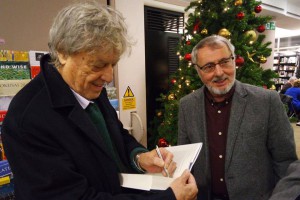In today’s post, Assistant Blog Editor Nina Perrotta reflects on the many books that accompanied her during a year abroad in Brazil, ranging from classic Japanese novels to contemporary fiction in translation.
Early in 2018, as I was preparing to move to Brazil, I picked up a faded old book from my parents’ bookshelf. Junichirō Tanizaki’s classic novel The Makioka Sisters, originally published in serial form in the mid-1940s, follows four sisters, two of whom are in need of husbands, as they navigate their own altered fortune and the clash between tradition and modernity in inter-war Japan. There’s nothing I love more than a really long novel, and this one, for me, was an ideal blend of familiar (the Jane Austen-style plot) and different (the specifics of Japanese society in that era, which I knew little about). In hindsight, it was probably my favorite of all the books I read this year.
As soon as I finished The Makioka Sisters, I started The Wind-Up Bird Chronicle by Haruki Murakami (who, notably, was shortlisted for Literary Review’s “Bad Sex in Fiction” award this year). Though the two novels were written nearly a half-century apart and have little in common, I enjoyed reading them back-to-back, especially since one of Murakami’s characters, who would have been a contemporary of the Makioka sisters, tells war stories from his time in the Japanese army during World War II.
As my trip to Brazil drew nearer, I rushed through The Wind-Up Bird Chronicle and, fortunately for my suitcase, managed to finish it just before I had to leave for the airport. Once at my gate, I got started on Charles Dickens’ massive Bleak House, which I had tried—and failed—to read once before. I promised myself that I would finish it this time, no matter how long it took. And so I spent the next two months carrying Bleak House around the streets of Curitiba, Brazil, reading it on the sunny couch in my apartment, and occasionally using it as a yoga block (it was about the right size).




